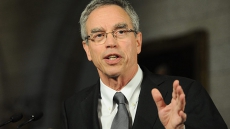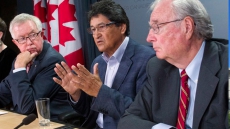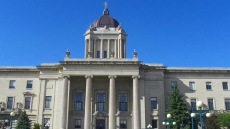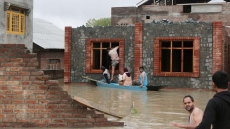NEWPORT, Wales - Seeking to counter Russian aggression, NATO leaders approved plans Friday to create a rapid response force with a headquarters in Eastern Europe that could quickly mobilize if an alliance country in the region were to come under attack.
NATO Secretary-General Anders Fogh Rasmussen said a command headquarters would be set up in Eastern Europe with supplies and equipment stockpiled there, enabling the "spearhead" force to mobilize and deploy quickly.
"It sends a clear message to any potential aggressor: Should you even think of attacking one ally, you will be facing the whole alliance," Rasmussen declared as a two-day NATO summit in southern Wales drew to a close.
NATO air patrol flights over the Baltic and other air, land and naval measures already in place will be extended indefinitely, Rasmussen said, as part of a readiness package that also calls for upgraded intelligence-sharing and more short-term military exercises.
Moscow responded by claiming that NATO was using the crisis in Ukraine as pretext to advance a longstanding goal to move its infrastructure closer to Russia's borders. In a statement, Russia's foreign ministry said it was studying the NATO announcements, but warned that the alliance's plans to conduct joint exercises in Ukraine later this year will "inevitably aggravate tensions, jeopardize the progress that has been made in the peace process in Ukraine and exacerbate the split in Ukrainian society."
Confronting another pressing international crisis, Rasmussen said NATO stands "ready to help" Iraq fight back against a violent militant group, but noted that the Iraqi government has not made any such request. President Barack Obama and British Prime Minister David Cameron have been pressing their NATO counterparts to join a coalition of nations that could degrade militants from the Islamic State group.
Prime Minister Stephen Harper, who attended the summit, announced the 30-day deployment of several dozen military advisers to Iraq to work with U.S. forces, providing tactical guidance to Iraqi troops and Kurdish fighters battling the Islamic State group. That is in addition to two Canadian military cargo planes that are ferrying weapons to the Kurds.
The prime minister said the deployment is not without risk but it is also not a combat mission.
The threat posed by the Islamic State overshadowed some of the NATO summit's official agenda. Yet the leaders still spent a considerable amount of their time discussing the crisis in Ukraine, with Ukrainian President Petro Poroshenko taking on a high-profile role during the talks.
The summit coincided with the declaration of a cease-fire that emerged Friday out of talks in Minsk, Belarus involving Ukraine, Russia and pro-Russian rebels. Ukrainian President Petro Poroshenko said he ordered government forces to stop hostilities, nearly five months after fighting broke out in the nation's restive east.
"I count on this agreement, including the ceasing of fire and the freeing of hostages, to be precisely observed," Poroshenko said.
Yet Western leaders remained skeptical that any such cease-fire would hold. The U.S. and Europe, meanwhile, have warned that they stand ready to levy more economic sanctions on Russia — a step a top White House official said could occur within days.
The crisis in Ukraine has been among the most pressing issues on the agenda during the summit. While Ukraine is not an alliance member, Russia's actions have prompted fears among NATO member countries in Central and Eastern Europe that the Kremlin could seek to make gains beyond their borders as well.
Rasmussen said the high-readiness force would give NATO a "continuous presence" in Eastern Europe, with alliance countries contributing forces on a rotational basis. There were no final decisions on where the forces would be based, but Rasmussen said Poland, Romania and the Baltics have all indicated a willingness to host the facilities.
"We must be able to act more swiftly," said Cameron, the British leader.
In another signal of its commitment to protecting its members in Eastern Europe, NATO announced that its next summit will be held in Warsaw, Poland, in 2016. Polish President Bronislaw Komorowski praised the alliance's willingness to boost its presence in the region, calling it "a matter of key importance to Poland's security."
On the sidelines of the summit, Cameron and Obama were also meeting with their counterparts to rally support for a mission to confront the Islamic State through military might, diplomatic efforts and economic penalties. Obama met Friday with Turkish President Recep Tayyip Erdogan, a key regional player whose support would be crucial to defeating the militants. Cameron also planned to meet with Erdogan.
Obama also met Friday with French President Francois Hollande.
Rasmussen suggested that NATO was unlikely to take imminent military action against the militants in Iraq, but said he could foresee the alliance engaging in a "defence capacity-building mission" there.
The U.S. is already launching airstrikes against the Islamic State in Iraq, and Britain has joined for humanitarian aid drops to besieged minority groups. Obama is weighing whether to extend the military mission into neighbouring Syria, where the extremists have establisheed a safe haven.
On other fronts, alliance leaders pressed NATO countries to follow through on commitments to spend 2 per cent of their nations' gross domestic product on defence. Only four NATO nations meet that threshold: the U.S., Britain, Greece and Estonia.
Komorowski said Poland would raise its defence budget to 2 per cent of GDP in 2016 and would encourage other members to increase defence spending as well.




